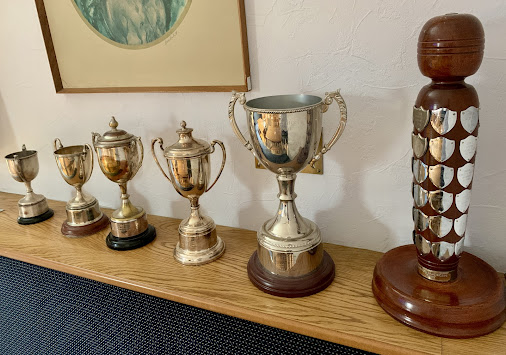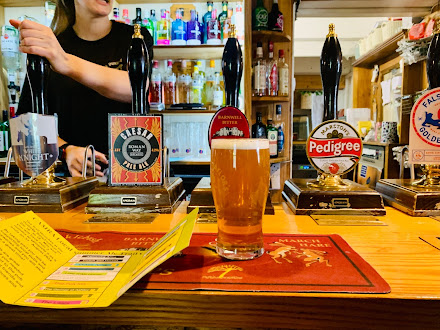It was on the way to the entrance that something caught my eye. Whilst the bar still has its Dartboard, across from the main body of the pub is a separate Games Room. If the Skittles Table hadn't been setup in line with the open doorway I guess I'd never have investigated, but there it was, a vintage Northamptonshire (or Leicestershire) Skittles Table, sharing space with the Pool Table.
Shove it, Chuck it, Toss it...
Images of Traditional British Pub Games
Thursday, 19 February 2026
The Black Horse - Foxton, Leicestershire
It was on the way to the entrance that something caught my eye. Whilst the bar still has its Dartboard, across from the main body of the pub is a separate Games Room. If the Skittles Table hadn't been setup in line with the open doorway I guess I'd never have investigated, but there it was, a vintage Northamptonshire (or Leicestershire) Skittles Table, sharing space with the Pool Table.
Thursday, 6 November 2025
The Mason Arms, Thrapston, Northamptonshire
Not all is lost though. Skittles Tables can still be found all over this part of the East Midlands, and leagues still operate if you know where to look for them, which is of course a major part of the problem. Northamptonshire Table Skittles has rarely seen much in the way of promotion by its players, and in common with a great many of our traditional pub games, those who play Skittles often regard it as just one of many, largely 'unremarkable' reasons why they go to the pub, and certainly see no reason to shout about it. It's probably time someone did shout about it though, lest the game disappear completely from pubs and clubs within our lifetime.
The Islip & District League is a much tighter affair. As can be seen on the fixture list above, the heart of the competition centres on the former Working Mens Club which fields no less than four teams. In fact this and the Rushden Four-a-Side Skittles League are run by long-serving Islip Club steward Terry Gunn.
Monday, 23 September 2024
The Piper, Kettering, Northamptonshire
 |
| 'What's On' at the Woolcomber, Ise Lodge |
Now I believed I’d covered Kettering’s estate pubs pretty comprehensively on this blog. I certainly thought I’d been to all of the outlying venues with a Skittles Table, classic post-war or later flat-roof locals for the most part, last bastions of a pub-going culture that's rapidly disappearing almost everywhere. The only pub I knew for sure I'd missed was the Leather Craftsman, a slightly run-down flat-roof local on the Ise Lodge estate that I'd driven past but decided I could leave for another day. I blinked and missed it though, the pub closed for good not long after, the building soon demolished to make room for yet more housing. Yet another skittles pub gone forever.
More recently The Harlequin on the Grange Estate has closed, plans now approved by the local council to convert to a convenience store. I did manage to visit The Harlequin once, though I have to say there wasn't a huge amount to see other than the Skittles Table (below). Change is of course one of the few absolute certainties of the pub trade, so a revisit to Kettering's estate pubs felt long overdue, before I blinked and missed another one.
The Ise Lodge estate lies to the east of the town centre, well served by the Woolcomber, which I'm pleased to say remains open and reassuringly unchanged since my last visit some four years ago. Which is to say a tidy and well-run pub with Darts, Pool, and Skittles Table. Much as I like the 'Wooly' it was another pub nearby that I was particularly interested in.
 |
| The Piper's entry in a 1990 CAMRA Pub Guide Note that there's no Skittles Table mentioned |
A pub like The Piper has always seemed to me to be a perfect fit for the local game, the right-hand bar, which is effectively a games room, has plenty of room alongside the Darts and Pool for a Skittles Table. Maybe the pub did have a table when it first opened way back in the 1950's. It seems likely to me, but in common with so many pubs built around this time, there's precious little to be found online about its early days.
Wednesday, 11 September 2024
Conservative Club, Barrow Upon Soar, Leicestershire
Barrow Upon Soar in Leicestershire's Soar Valley is probably best known for the impressive Plesiosaur fossil that was discovered by workmen digging a Lime Pit in 1851, the original, now catchily renamed Rhomaleosaurus Megacephalus, resides in Leicester's New Walk Museum. Villagers are clearly proud of their fossil, examples of which are reproduced all over the village (above) as part of a Fossil Trail that I didn't have time to explore. I suspect this may be the only thing Barrow is truly famous for, although it's position on the navigable River Soar is how many outsiders will have come across the village, and the extensive Lime Works are a notable landmark when viewed from the Midland Mainline between Leicester and Loughborough.
There is of course much more to Barrow than ancient aquatic fossils. The pubs of the village for example, of which there are a fair few. In fact Barrow Upon Soar strikes me as being a relatively small village that's slightly over-pubbed! Not that I believe anywhere can truly be over-pubbed if the locals are keen to use them, so let’s rephrase that as 'blessed' with good number of pubs and clubs, most of which I found to be very good indeed on a recent visit to the village.We might expect that a Leicestershire village as comprehensively pubbed as Barrow would be a happy hunting ground for traditional pub games, indeed the Soar Valley area remains one of the strongholds of Leicestershire's unique version of Alley Skittles. In fact Barrow itself has only two alleys as far as I can tell, of which only one is in regular use for competition, the Working Men's Club in nearby Sileby being the only other venue for league play within walking distance. The fact is that many of the pubs and clubs in the area have lost their skittle alleys, the Blue Bell in Rothley converting theirs to a restaurant as recently as 2014 for example.
Tuesday, 23 July 2024
Dukes Arms, Woodford, Northamptonshire
 There are of course many exceptions. Take the subject of this post for example, a pub hitherto known as The Dukes Arms, and prior to that The Falcon Inn, The Lord St John's Arms, and The Lords Arms before the appendages were amputated. Unnecessary change we might imagine, yet hardly unique. My own local the Royal George in Cottingham is known by all and sundry as The George, the now closed Spread Eagle in the village was always truncated to The Spread, and even the long closed Red Lion in Middleton was generally referred to as The Red by locals. What chance thirsty Woodford folk arranged to meet-up for pints at the Dukes Arms? Not likely I'd imagine, particularly given that abbreviating to "The Dukes" saves a few seconds of precious extra drinking time when opening hours were necessarily limited. In truth it's surprising that any 'Arms', 'Heads', or indeed 'Horses' have survived at all in pub names given that they're so rarely used by the locals.
There are of course many exceptions. Take the subject of this post for example, a pub hitherto known as The Dukes Arms, and prior to that The Falcon Inn, The Lord St John's Arms, and The Lords Arms before the appendages were amputated. Unnecessary change we might imagine, yet hardly unique. My own local the Royal George in Cottingham is known by all and sundry as The George, the now closed Spread Eagle in the village was always truncated to The Spread, and even the long closed Red Lion in Middleton was generally referred to as The Red by locals. What chance thirsty Woodford folk arranged to meet-up for pints at the Dukes Arms? Not likely I'd imagine, particularly given that abbreviating to "The Dukes" saves a few seconds of precious extra drinking time when opening hours were necessarily limited. In truth it's surprising that any 'Arms', 'Heads', or indeed 'Horses' have survived at all in pub names given that they're so rarely used by the locals.In common with so many rural and village pubs, the Dukes has had the custom of three pubs squeezed into one. The Prince of Wales and White Horse have both gone for good in recent years leaving the Dukes as the only pub in what is a fairly substantial Northamptonshire village. The Working Mens Club is also still going strong though, reinvented on a shiny new site as the village's Community & Sports Club. New it may be but the traditions of old have been maintained with two Skittles Tables in the well-appointed games room.
Tuesday, 25 June 2024
Midland Band Social Club, Kettering, Northamptonshire
There are of course plenty enough exceptions where traditional games continue to be popular, and when one falls practically on my own doorstep it would be remiss of me not to get back on the horse, charge up the camera, and sing its praises with a blog post.
Equally popular for its great beer, and also conveniently open all day every day, is the Midland Band Social Club. Located a little way out of the the centre, it's just a short walk through Kettering's old terraced housing, and much of the town's remaining Boot & Shoe manufacturing heritage to the north of the town. As the name suggests, the club was originally established as a home for one of the town's Silver Bands in 1896. Back then a small outdoor Beerhouse served Northampton brewed Phipps ales, today the much expanded club might almost be regarded as a local 'Tap' for the nearby Potbelly Brewery, and the bar is perhaps second only for choice of ales to the Alex'.






















































